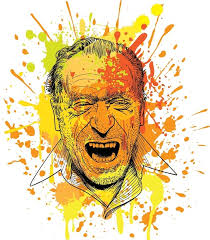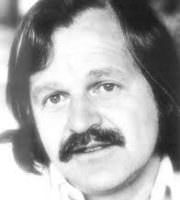This timely passage is excerpted (pgs 53-54) from Thich Nhat Hanh's How to Smile Copyright © 2023 Plum Village Community of Engaged Buddhism on behalf of Parallax Press, Berkeley, California, www.parallax.org. Do not duplicate.
All though the following is not one of his poems, Thich Nhat Hanh's message strikes me as perfect for our difficult age.
Our World
by Thich Nhat Hanh
Many of us worry about the world situation. As
individuals, we feel helpless, despairing. The
situation is so dangerous, injustice is so wide-
spread, the danger is so close. In this kind of
situation, if we panic, things will only become
worse. We need to remain calm, to see clearly.
Meditation is to be aware and to try to help.
After the war, many people left Vietnam to
travel in small overcrowded boats across the
Gulf of Siam. Often they were caught in storms
or rough seas. People could panic, making
the boat more likely to sink. But if one person
aboard could remain lucid and calm, knowing
what to do and what not to do, that person
could help the boat survive. Their voice and
body would communicate clarity and calm;
people would trust them and listen to what
they had to say. One such person can save
the lives of many. Our world is something like
a small boat. Compared with the cosmos, our
planet is a very small boat. We may be about
to panic because our situation is no better than
that of the small boat in the sea. Humankind
has become a very dangerous species. We
need people who can sit still, are able to smile,
and can walk peacefully in order to save us. In
my tradition it’s said that you are that person,
that each of us is that person.
Having served three years, I felt that it was time to place the baton into Gwynn's very capable hand. Gwynn who was Poet Laureate back in the day, accepted with enthusiasm. She'll do a fantastic job! - Ed Coletti
And from Gwynn, Dear Poetry Fans and Newcomers,
Our first 2025 reading at Cafe Frida Gallery, 300 South A Street, Santa Rosa, on the outdoor stage, will take place on Sunday,
March 30th at 1 pm. Any of you who have attended know this series to be a joyful festival that Ed Coletti began following the height of the pandemic when poets and audiences were hungry to get out and mingle. Each subsequent gathering has been similarly well-received by large (at least by poetry reading standards) audiences. Come one, come all! This year’s additional Festival readings will be on June 29th and September 28th. As we enter the Festival’s 4th year, Ed Coletti is moving on to other things, and has entrusted this valuable enterprise to me. I am honored and I will do my best. We will all miss Ed as instigator, curator and MC, but he will be one of the readers at the next Cafe Frida Poetry Festival on June 29th. I’m pleased and proud to present the reading order of the terrific poets for March 30th: —Gwynn O’Gara (Ed had a hand in this.)
—Bill Greenwood
—Rita Losch
—Karl Frederick
—Shawna Swetech
—Chris Giovachini
—Susan Lamont
—David Madgalene Hope to see you on the 30th, and please say Hi. There are many of you I don’t know and would like to (“friends I haven’t met yet” as Gene Ruggles would say). Consider arriving early for lunch and great music! Cheers to all, Gwynn O'Gara
AND NOW FOR SOMETHING COMPLETELY DIFFERENT
Charles Bukowski
If you're losing your soul and you know it, then you've still got a soul left to lose.
-Charles Bukowski
Trashcan Lives
the wind blows hard tonight and it's a cold wind and I think about the boys on the row. I hope some of them have a bottle of red. it's when you're on the row that you notice that everything is owned and that there are locks on everything. this is the way a democracy works: you get what you can, try to keep that and add to it
My personal experience with the work of Bukowski began somewhat naively as expressed in my own poem
"Ed Coletti’s poem is a boozy nod to Bukowski’s busted saints and spider-veined 'glory,' significantly asking “Is this poetry?”-- before answering with a resigned grin and sinking into ultimate pleasure." -- XCarl Macki
Bukowski Sometimes Makes Me Happy
at a small college near the beach
sober
the sweat running down my arms
a spot of sweat on the table
I flatten it with my finger
blood money blood money
my god they must think I love this like the others
but it's for bread and beer and rent
blood money
I'm tense lousy feel bad
poor people I'm failing I'm failing
a woman gets up
walks out
slams the door
a dirty poem
somebody told me not to read dirty poems
here
it's too late.
my eyes can't see some lines
I read it
out-
desperate trembling
lousy
they can't hear my voice
and I say,
I quit, that's it, I'm
finished.
and later in my room
there's scotch and beer:
the blood of a coward.
this then
will be my destiny:
scrabbling for pennies in tiny dark halls
reading poems I have long since become tired
of.
and I used to think
that men who drove buses
or cleaned out latrines
or murdered men in alleys were
fools.
*******************
damned things ever,
the gathering of the clansmen and clanladies,
week after week, month after month, year
after year,
getting old together,
reading on to tiny gatherings,
still hoping their genius will be
discovered,
making tapes together, discs together,
sweating for applause
they read basically to and for
each other,
they can't find a New York publisher
or one
within miles,
but they read on and on
in the poetry holes of America,
never daunted,
never considering the possibility that
their talent might be
thin, almost invisible,
they read on and on
before their mothers, their sisters, their husbands,
their wives, their friends, the other poets
and the handful of idiots who have wandered
in
from nowhere.
I am ashamed for them,
I am ashamed that they have to bolster each other,
I am ashamed for their lisping egos,
their lack of guts.
if these are our creators,
please, please give me something else:
a drunken plumber at a bowling alley,
a prelim boy in a four rounder,
a jock guiding his horse through along the
rail,
a bartender on last call,
a waitress pouring me a coffee,
a drunk sleeping in a deserted doorway,
a dog munching a dry bone,
an elephant's fart in a circus tent,
a 6 p.m. freeway crush,
the mailman telling a dirty joke
anything
anything
but
these.
Writing Instructions
.jpg)
Robert Graves to Alastair Reed
 "I confessed the difficulty of putting the images I saw into adequate words, and he nodded eagerly. 'This is, my dear, the work before us, always. To find a language adequate to what is revealed. I’m glad you know this. I feel the same consternation quite often, trying to attach feelings to words, to summon the image and declare it pure.'” -(quote from Borges in Jay Parini Borges and Me pg162
"I confessed the difficulty of putting the images I saw into adequate words, and he nodded eagerly. 'This is, my dear, the work before us, always. To find a language adequate to what is revealed. I’m glad you know this. I feel the same consternation quite often, trying to attach feelings to words, to summon the image and declare it pure.'” -(quote from Borges in Jay Parini Borges and Me pg162**********************
Fran Claggett's Tribute Causes Me to Blush
Felicity du Fleur, at a poetry reading
Just the other day, at a poetry reading
organized by our own Ed
Coletti at the
Frida Cafe, yes, that Frida,
we see her
always in pain in her art,
married to
Diego, but he had nothing to
do with
her pain, well, we don't
know, do we.
but she gave her name to this
cafe, made for
poetry, with a stage and
shade, just perfect,
anyway, as I was saying, the
other day,
Sunday, it was, the poetry
lovers of Sonoma
were there to hear some of
our wonderful
poets, well, Ed himself, read
and I must tell
you, his poems were, well,
simply said, the
absolute best we heard all
afternoon, so good
I can't wait to read them in
print, not only the
one about crows, since he and
I both know that
is a winner, but the second
one, and I can't recall
the title, but it was, well,
just great, a totally fine
poem and I should know,
because although my name
is Felicity du Fleur, it
might as well have been
Felicity du Poetas because I
know a great poem
when I hear it and I heard Ed
read it last Sunday,
but what I really want to
tell you today is that
every time I lifted my eyes
to the wall, the WAll
at the entrance of the Cafe,
the whole wall, the
entire bank of it was
shimmering with a deep deep
beyond the pale purple flower,
an absolute purple
totally covering the
wall...on and on, as far as the
wall went, as far as Ed's
poem took me,
Felicity du Fleur/Poetas at
this, Frida's purple cafe.
Felicity du Fleur
aka fran
claggett-holland
The Fifth Day
On the fifth day
the scientists who studied the rivers
were forbidden to speak
or to study the rivers.
The scientists who studied the air
were told not to speak of the air,
and the ones who worked for the farmers
were silenced,
and the ones who worked for the bees.
Someone, from deep in the Badlands,
began posting facts.
The facts were told not to speak
and were taken away.
The facts, surprised to be taken, were silent.
Now it was only the rivers
that spoke of the rivers,
and only the wind that spoke of its bees,
while the unpausing factual buds of the fruit trees
continued to move toward their fruit.
The silence spoke loudly of silence,
and the rivers kept speaking
of rivers, of boulders and air.
Bound to gravity, earless and tongueless,
the untested rivers kept speaking.
Bus drivers, shelf stockers,
code writers, machinists, accountants,
lab techs, cellists kept speaking.
They spoke, the fifth day,
of silence.
- Jane Hirshfield























